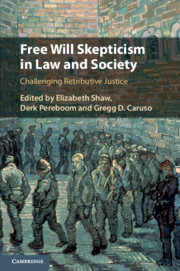Book contents
- Free Will Skepticism in Law and Society
- Free Will Skepticism in Law and Society
- Copyright page
- Contents
- Contributors
- Chapter 1 Free Will Skepticism in Law and Society: An Overview
- Part I On the Practical Implications of Free Will Skepticism
- Part II Alternatives to Retributive Punishment
- Part III Free Will Skepticism and the Criminal Justice System
- Chapter 8 Fichte and Psychopathy: Criminal Justice Turned Upside Down
- Chapter 9 Causality and Responsibility in Mentally Disordered Offenders
- Chapter 10 The Implications of Free Will Skepticism for Establishing Criminal Liability
- Chapter 11 Free Will Skepticism and Criminal Punishment: A Preliminary Ethical Analysis
- Index
- References
Chapter 8 - Fichte and Psychopathy: Criminal Justice Turned Upside Down
from Part III - Free Will Skepticism and the Criminal Justice System
Published online by Cambridge University Press: 26 August 2019
- Free Will Skepticism in Law and Society
- Free Will Skepticism in Law and Society
- Copyright page
- Contents
- Contributors
- Chapter 1 Free Will Skepticism in Law and Society: An Overview
- Part I On the Practical Implications of Free Will Skepticism
- Part II Alternatives to Retributive Punishment
- Part III Free Will Skepticism and the Criminal Justice System
- Chapter 8 Fichte and Psychopathy: Criminal Justice Turned Upside Down
- Chapter 9 Causality and Responsibility in Mentally Disordered Offenders
- Chapter 10 The Implications of Free Will Skepticism for Establishing Criminal Liability
- Chapter 11 Free Will Skepticism and Criminal Punishment: A Preliminary Ethical Analysis
- Index
- References
Summary
The two instruments the state uses to maintain order are the corrective and the preventive. Those who reject the notion of moral responsibility either prefer to abandon punishment in favor of preventive techniques or seek to justify (nonretributive) punishment. Although I think punishment is essentially retributive and cannot be justified, I also think we must, if possible, avoid yielding to the preventive worldview. We must distinguish the lengths to which we are willing to go with incompetent or irrational individuals who are dangerous from the lengths to which we are willing to go with rational and competent offenders. My view is that borrowing from punishment its harsh methods we maintain the dignity of competent offenders when we subject them to these methods with the aim of leading them to abandon the defective motivational traits that resulted in the crime. I call this approach correction rather than punishment, because it lacks the retributive element that makes punishment punishment. Here I suggest how this view might be defended if we start, as Fichte does, from the assumption that those who violate any law deserve to be made outlaws; in current terminology, to be subjected to preventive detention and preventive techniques generally.
- Type
- Chapter
- Information
- Free Will Skepticism in Law and SocietyChallenging Retributive Justice, pp. 161 - 176Publisher: Cambridge University PressPrint publication year: 2019
References
- 1
- Cited by

